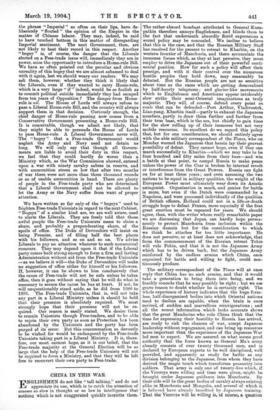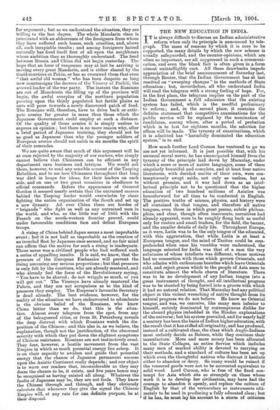CHINA IN THIS WAR.
ENGLISHMEN do not like "tall talking," and do not appreciate its use, which is to catch the attention of masses so slow in thought or so low in intelligence that nothing which is not exaggerated quickly inspirits them. The rather absurd bombast attributed to General Kim- patkin therefore annoys 'Englishmen, and blinds them to the fact that underneath absurdly florid expressions a sound. policy may be concealed. We incline to believe that this is the case, and that the Russian Military Staff has resolved for the present to retreat to ICharbin, on the western frontier of Manchuria, and there accumulate the immense forces which, as they at last perceive, they must employ to drive the Japanese out of their powerful conti- nental position. How far such a policy will affect their prestige, and with it their control over the numerous hostile peoples they hold down, may reasonably be debated. But the Russian people are not so sensitive about time as the races which are getting demoralised by half-hourly telegrams ; and glacier-like movements which to Englishmen and Americans appear intolerably slow strike their semi-Oriental imaginations as truly majestic. They will, of course, defend every point en route that can be defended—Port Arthur, Vladivostok, Liao-yang, Kharbin itself—partly to exhaust the Japanese numbers, partly to draw them further and further from their true base, which is the sea, but chiefly to gain time for the slow rolling up of their immense but not very mobile resources. So excellent do we regard this policy that, but for one consideration, we should. entirely agree with the able military correspondent of the Times, who on Monday warned the Japanese that herein lay their gravest possibility of defeat. They cannot hope, even if they can march successfully to Kharbin—which we may take to be four hundred and fifty miles from their base—and win a battle at that point, to compel Russia to make peace unless the power of the Czar is broken by internal revolt or interference from the Great Powers. Russia can fight on for at least three years ; and even assuming the two nations to be equal in military qualities, the weight of the European Power must ultimately wear down its Asiatic antagonist. Organisation is much, and genius for battle is more, but even if the Dutch were commanded by a Napoleon, and were possessed individually of the qualities of British officers, Holland. could not in a life-or-death struggle hope to defeat France, more especially if the first great exertion must be repeated for years. We should agree, then, with the writer whose really remarkable paper we are discussing that Japan can hardly hope perma- nently to protect Manchuria from inclusion within the Russian domain but for the consideration to which we think he attaches far too little importance. He does not perceive, or at least does not acknowledge, that from the commencement of the Russian retreat Tokio will rule Pekin, and that it is not the Japanese Army which has to be driven back, but the Japanese Army reinforced by the endless armies which China, once organised for battle and willing to fight, could con- tinuously produce.
The military correspondent of the Times will at once reply that China has no such armies, and that it would take a generation to bring them into being, and we frankly concede that he may possibly be right ; but we see grave reason to doubt whether he is certainly right. The whole experience of history indicates that the huge form- less, half-disorganised bodies into which Oriental nations tend to decline are capable, when the brain is once revived, of sudden and marvellous reinvigorations ; and all the recent information which looks accurate shows that the great Mandarins who rule China think that the time for expressing their hostility to Russia has arrived, are ready to risk the chances of war, accept Japanese leadership without repugnance, and can bring up resources more important than the experience of the Japanese War led men to expect. We are assured on what seems good authority that the force known as General Ma's army already consists of over twenty thousand men, and is declared by European experts to be well disciplined, well provided, and apparently as ready for battle as any division belonging to the Japanese, from whom they have derived the magic touch which transforms peasantry into soldiers. That army is only one of twenty-five which, if the Viceroys were willing and time were given, might be brought under Japanese guidance into Manchuria. By their side will be the great bodies of cavalry always existing alike in Manchuria and Mongolia, and several of which it is believed have already benefited by Japanese training. That the Viceroys will be willing is, of course, a question 442 THE SPECTATOR. [March 19, 1904.
for argument ; but as we understand the situation, they are willing to the last degree. The whole Mandarin class is penetrated with an abhorrence of the foreigners from whom they have suffered such losses, such cruelties, and, above all, such inexpiable insults ; and among foreigners hatred naturally has fixed itself first of all upon the neighbours whose ambition they so thoroughly understand. The feud .between Russia and China did not begin yesterday. The hope that an hour of vengeance may at last be arriving is moving every great Mandarin, and is either shared by the timid courtiers at Pekin, or has so overawed them that even "that awful old woman" who has been despotic so long now countersigns the decrees of the Viceroy of Pechili, the avowed leader of the war party. The instant the Russians are out of Manchuria, the filling up of the province will begin, the awful overplus of the northern population pouring upon the thinly populated but fertile plains as ants will pour towards a newly discovered patch of food. The Russians will, therefore, have to drive back or extir- pate armies far greater in mass than those which the Japanese Government could employ at such a distance. Of the quality of those armies it is simply useless to express an opinion ; but there is no more reason why, after a brief period of Japanese training, they should not be as good as Japanese than why the younger soldiers of European armies should not catch in six months the spirit of their comrades.
We are quite aware that much of this argument will be at once rejected by the majority of our readers, who simply cannot believe that Chinamen can be efficient in any department save business and intrigue. We would ask them, however, to read any sensible account of the Taeping Rebellion, and to see how Chinamen throughout that long war died in heaps for ideas, for their leaders on each side, and on one or two great occasions in obedience to official commands. Before the appearance of General Gordon it seemed nearly certain that the untrained masses behind the Taeping leader would overwhelm by sheer fighting the entire organisation of the South and set up a new dynasty. All over China there are hordes of " brigands " who fight as well as any untrained men in the world, and who, as the little war of 1885 with the French on the south-western frontier proved, could under favourable conditions face and defeat European troops.
A rising of China behind Japan seems a most improbable event ; but it is not half as improbable as the creation of an ironclad fleet by Japanese once seemed, and no fair mind can affirm that the motive for such a rising is inadequate. There never was a civilised people who had suffered such a series of appalling insults. It is said, we know, that the pressure of the European Embassies will prevent the rising assuming any serious proportions ; but that pressure is only felt by the courtiers, who are already mastered, and who already feel the force of the Revolutionary saying, "You have to be shaved; do not wriggle so much, or you will get cut." The Viceroys have already mastered the Palace, and they are not scrupulous as to the kind of pressure they employ. The Empress's favourite Secretary is dead already. The best evidence, however, for the -reality of the situation we have endeavoured to adumbrate is the obvious belief of the Russians, who know China better than we do, that this is the situa- tion. Almost every telegram from the spot, from any of the beleaguered cities, or from St. Petersburg reveals the deep distrust with which Russians watch the dis- position of the Chinese; and this also is, as we believe, the explanation, though not the justification, of the abnormal severity with which they put down the slightest symptoms of Chinese resistance. Russians are not instinctively cruel. They fear, however, a hostile movement from the vast Empire in which so much potential energy lies asleep. It is on their capacity to awaken and guide that potential • energy that the chance of Japanese permanent success upon the Asiatic Continent really depends ; and our object is to warn our readers that, inconsiderable as they may deem the chance to be, it exists, and five years hence may be recognised as having existed all along. Whatever the faults of Japanese may be, they are not fools. They know the Chinese through and through, and they obviously calculate that whenever they give the signal the Chinese Empire will, at any rate for one definite purpose, be at their disposal.











































 Previous page
Previous page